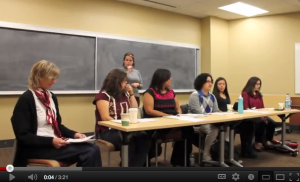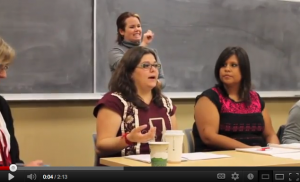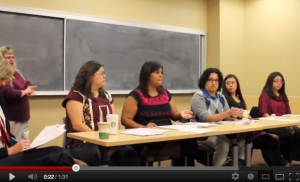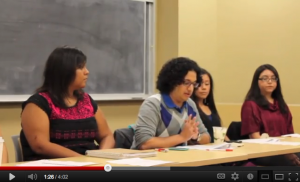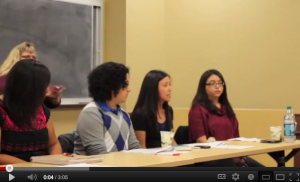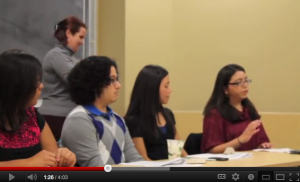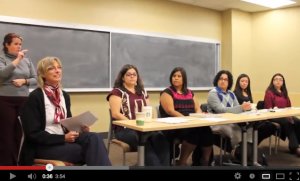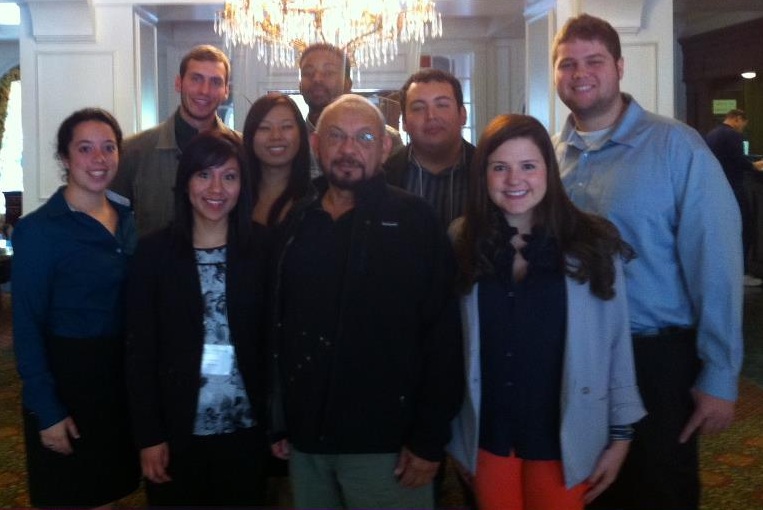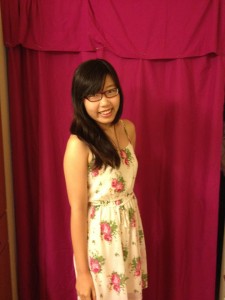In the final part of our series looking at the “Opening the Blinds” panel – dealing with the experiences of students of color here at UT and previously highlighted here and here – we offer a conversation between Juan Portillo, organizer of the panel, and Amias Maldonado, blog editor and fellow scholar of gender and critical race theory.
What was your reason for organizing this conference in the first place?
Lately I had noticed events happening this semester that may not be new but that students were definitely reacting to. I’m thinking of everything from the bleach bombings and the problematic fraternity parties to the struggles of students of color on the campus at large. These ideas of micro-aggressions and the invisible ways that students become marginalized and experience marginalization worried me. I wanted to understand more about it from a professional point of view as a scholar but also from a personal point of view as someone who is a student here, someone who works with students. Someone who has gone through some of these micro-aggressions
Obviously UT has had a checkered past when it comes to issues of racial aggression macro or micro: you can still see the segregated bathrooms in the main building, you can still see the statues of Confederate nobility around the South Mall, but at the same time, it seems like there’s something new or different in the sort of ferocity or intensity of things that are going on right now.
Mm-hm
So do you see there being something new going on here in terms of the climate of the University or do you see this as ultimately part of a larger trend that we haven’t been paying attention to but has been festering in the shadows?
I think it’s a little bit of both. I mean, it’s definitely something that never stopped. I mentioned a book during the presentation called “Integrating the 40 Acres,” and that book delineates the history of integration at UT and how the issues that students face today are still the same, they’re just being played out differently; we’re no longer fighting for the right to be here, but for the right to be really included. One way that I explain it is that students of color, female students, queer students, any kind of non-normative student is tolerated, right? That’s the kind of discourse around them. These are bodies that are supposed to be tolerated on campus, but that’s not the same as integrated, or included, or having the same kind of presence as others, right?
Definitely. Sara Ahmed has this notion of institutional passing, where she talks about how in the diversity world, what’s important is for bodies to produce sameness, and insomuch as you don’t produce sameness, as you show yourself as different, that’s immediately read as threatening and racist in itself. So the responsibility is on the non-normative student to act in line with everyone else and sort of disavow or cover up their cultural heritage, their sexual orientation, etc.
And that’s something that’s been going on. This sameness denies students a voice to actually speak up against injustice that is very real. People highlighting racial bias, gender bias, class bias at UT goes against some kind of fantasy that we’ve all bought into that everybody should be the same and that everybody is the same and that if we just don’t talk about the differences, marginalization will go away.
I think another important part of the panel and your work is the role of space. A lot of times people think about race or gender as attached to bodies, you know, but it’s really not just on bodies, it’s also in matters of space, so I was wondering if you could talk a little about that, about how space can become raced and gendered.
So most of my ideas about space and the way space is gendered and racialized came from Nirwal Puwar’s Space Invaders. Just listening to students of color or female students in male dominated fields like engineering and their experiences in the class – what they feel, how they feel, what people tell them – kind of uncovers or untangles all these forces of oppression that are still around.
So just to be clear for the non-critical race scholars out there, when we’re saying that the University is a white male space, what do we mean by that?
First of all, those bodies were inhabiting the space. It’s kind of a philosophical tradition to think that knowledge is disembodied. But in fact, knowledge happens through experience, through the person who is writing the book, through the lecturer talking to his class. So this space physically was reserved mostly for white male bodies from the inception of the University. They were creating knowledge and in doing so, they defined what counts as “real” knowledge. And this tradition carried on until finally it was challenged to include other bodies. Black bodies, female bodies, queer bodies, disabled bodies. And their inclusion transgressed this boundary that was set up around the University space. The only real bearers of knowledge were the white male bodies, but now we have women and people of color here and that crates an anxiety over who has the right to say what counts as the real truth. It’s a challenge to authority and to the authorship of knowledge.
I want to go back to the importance of privilege real quick. To me, when you’re an ally for racial or social or sexual justice, it’s not that you will always say the right thing or you will always recognize your privilege but that you have to be open to interrogating yourself and interrogating the ways in which your own assumptions are informed by your privilege and be willing to critically analyze yourself. I think there’s a lot of tension around that for allies who believe in social justice that they want to sort of “cleanse themselves” of their complicity in these structures but the fact is, you can’t cleanse yourself. You just have to be open to recognizing your privilege. Would you agree with that?
Yeah, I think one of the things that we wanted to also spotlight in the panel was that it’s important to turn the lens around on yourself. And whether you’re a researcher or not, we’re usually very comfortable analyzing others or analyzing situations as though we were not in it. But starting to understand how we are part of these institutions will have large repercussions on how we shape our institutions and communities.
So talking about tackling oppression in the institution, one of the things I was struck by in the talk was how the women on the panel navigated their relationship to the University. In a class recently, we read a book about Black Panther Party health care initiatives. One of the things that they struggled with was this tension between wanting the legitimacy that came with federal funding and the desire to maintain a critical perspective on the medical-industrial complex as a whole. In the talk, you saw these same kinds of dialogues occurring within La Collectiva Feminil. They want to critique UT as an institution but at the same time there are some things to be gained by being part of the institution, so I wondered if you could speak to that tension of being a critic and being a revolutionary from the outside on the institution but at the same time wanting to sort of use institutional structure to create change from within as well.
Well, the way I’ve heard a lot of people talk about this idea that to be revolutionary, you have to kind of oppose the institution. That once you become part of the institution you stop being revolutionary. That does explain part of it, but I feel that at a deeper level, what the panel exposed was that their resistance to being institutionalized is also an effort to maintain a particular consciousness. These are students coming from an experience that is way outside what we think the mainstream student would be or the mainstream professor would be. It’s almost like inhabiting a different dimension if that makes sense.
It does.
These are women who identify as, or have created, a queer feminine space. Most of them are first generation college students. So I think there’s hope there in the sense that – and I can’t even begin to describe exactly what I think they’re doing and what I think their goals are because I haven’t had that experience – but I just know that they have something very special going on that necessitates further analysis with theories created in the margins.
Yeah. Because there’s also another tension at work here that activist organizations have. This one is between wanting to change the system on a larger level but also for the members of that group, just wanting to have livable lives and to have that space to practice self-help, self-health, and to have a community that you can call your own without having to compromise. And that takes priority sometimes over these larger institutional issues because ultimately they’re just students that are trying to get through college.
But I think both structures can co-exist as long as we don’t try to impose a particular definition of what they are right now and what they should be if they become part of the institution. They have a space and a consciousness through the members of that group that’s fluid, that recognizes – that thrives, actually – in ambivalence. Their very survival depends on embracing ambivalence which is something that UT as an institution doesn’t necessarily do. But UT doesn’t have to understand it to be able to work with the students. They don’t have to submit to all the rules to still work with UT and still be a positive influence at UT.
So what was the experience of the panel that you organized? What did they think about the experience, what did they say to you afterwards?
They were extremely happy. They felt like somebody listened to them, I think that was the main thing. That somebody was listening. I felt the same way. That somebody is listening and that transformations can happen. The fact that the panel was composed of a mixture of undergraduate and graduates students and a staff member of UT showed how we can have an intellectual and rigorous conversation that doesn’t have to be structured in a rigid academic way.
Good point.
So not just what we said, but how we said it and how the audience responded made all of us extremely, extremely happy. Even the audience members came to me later and they were like, “We never thought that these conversations could happen in this room, in this building, in this department.” But as far as the panelists go, they were very…..it was almost therapeutic in a way. It was a way to reconstitute themselves as human beings.
Yeah, totally. And it was great in the audience to see that it was just as diverse as the panel. There were undergraduates, there were graduate students, there were professors like that lady in the back…
Yeah!
Who gave that amazing and troubling historical perspective on women of color faculty at UT. You don’t expect that kind of critical voice coming from an older white woman, but there she is. That’s an ally that if you just saw her passing in the hall, you would never know that you had that ally there. I also saw a man I know that does diversity work for the Division of Housing and Food at UT, so it speaks to the idea that there was a hunger and a need to sort of address the silence around these sorts of issues.
Yeah, and the panelists definitely want to do more. Whether it’s just us talking about what happened and what to do next or whether it’s a new conversation entirely. And I know that here in the department, we also want to do more. Just follow this format – a format that’s more fluid, that can address different issues, different interests. There’s definitely some momentum here that we can take advantage of.

